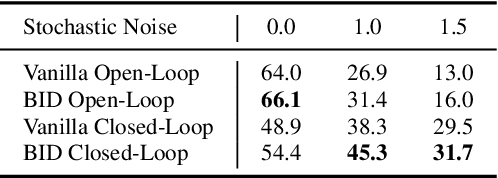Bidirectional Decoding: Improving Action Chunking via Closed-Loop Resampling
Paper and Code
Aug 30, 2024



Predicting and executing a sequence of actions without intermediate replanning, known as action chunking, is increasingly used in robot learning from human demonstrations. However, its effects on learned policies remain puzzling: some studies highlight its importance for achieving strong performance, while others observe detrimental effects. In this paper, we first dissect the role of action chunking by analyzing the divergence between the learner and the demonstrator. We find that longer action chunks enable a policy to better capture temporal dependencies by taking into account more past states and actions within the chunk. However, this advantage comes at the cost of exacerbating errors in stochastic environments due to fewer observations of recent states. To address this, we propose Bidirectional Decoding (BID), a test-time inference algorithm that bridges action chunking with closed-loop operations. BID samples multiple predictions at each time step and searches for the optimal one based on two criteria: (i) backward coherence, which favors samples aligned with previous decisions, (ii) forward contrast, which favors samples close to outputs of a stronger policy and distant from those of a weaker policy. By coupling decisions within and across action chunks, BID enhances temporal consistency over extended sequences while enabling adaptive replanning in stochastic environments. Experimental results show that BID substantially outperforms conventional closed-loop operations of two state-of-the-art generative policies across seven simulation benchmarks and two real-world tasks.
 Add to Chrome
Add to Chrome Add to Firefox
Add to Firefox Add to Edge
Add to Edge